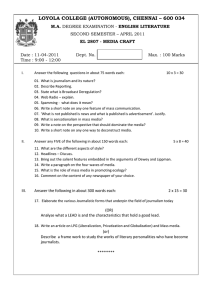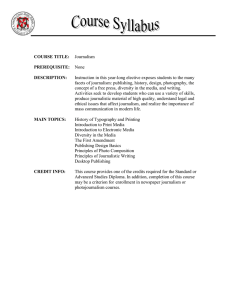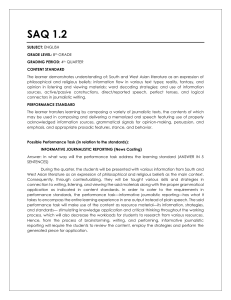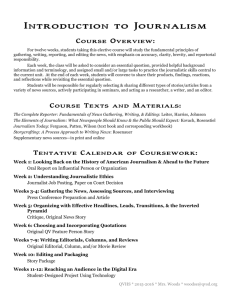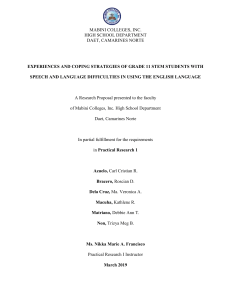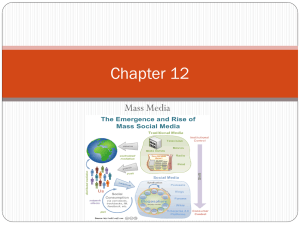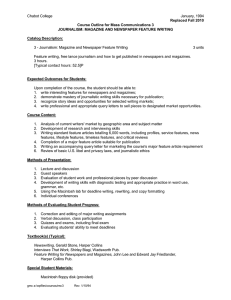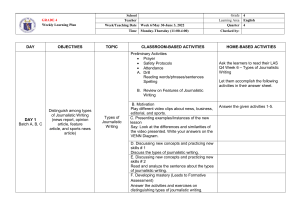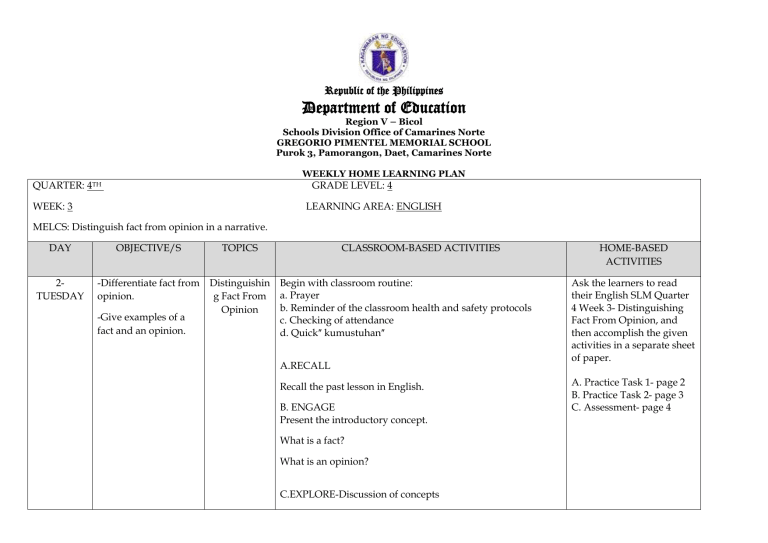
Republic of the Philippines Department of Education Region V – Bicol Schools Division Office of Camarines Norte GREGORIO PIMENTEL MEMORIAL SCHOOL Purok 3, Pamorangon, Daet, Camarines Norte WEEKLY HOME LEARNING PLAN QUARTER: 4TH GRADE LEVEL: 4 WEEK: 3 LEARNING AREA: ENGLISH MELCS: Distinguish fact from opinion in a narrative. DAY 2TUESDAY OBJECTIVE/S TOPICS CLASSROOM-BASED ACTIVITIES -Differentiate fact from Distinguishin Begin with classroom routine׃ opinion. g Fact From a. Prayer b. Reminder of the classroom health and safety protocols Opinion -Give examples of a c. Checking of attendance fact and an opinion. d. Quickʺ kumustuhanʺ A.RECALL Recall the past lesson in English. B. ENGAGE Present the introductory concept. What is a fact? What is an opinion? C.EXPLORE-Discussion of concepts HOME-BASED ACTIVITIES Ask the learners to read their English SLM Quarter 4 Week 3- Distinguishing Fact From Opinion, and then accomplish the given activities in a separate sheet of paper. A. Practice Task 1- page 2 B. Practice Task 2- page 3 C. Assessment- page 4 Ask the pupils of their idea about “Fact and Opinion” D.EXPLAIN 1. Discuss the difference between fact and opinion. 2. Give examples of a fact and an opinion. E. Elaborate What is a fact? - A fact is a statement that can be verified or proven true or false. - It can be supported by evidence. Ex. Lapu-Lapu and his men fought against Spanish soldiers who came to conquer our land. What is an opinion? - An opinion, on the other hand, is an expression of one’s thoughts or emotions. Ex. Lapu- Lapu is truly a great hero. Can you tell if the following statements are facts or opinions? - Jose Rizal is our national hero. (Fact or Opinion) - All Filipinos love our national hero. (Fact or Opinion) F. Evaluation Present the assessment task to the pupils. Republic of the Philippines Department of Education Region V – Bicol Schools Division Office of Camarines Norte GREGORIO PIMENTEL MEMORIAL SCHOOL Purok 3, Pamorangon, Daet, Camarines Norte WEEKLY HOME LEARNING PLAN QUARTER: 4th GRADE LEVEL: 4 WEEK: 4 LEARNING AREA: ENGLISH MELCS: Identify features of journalistic writing. DAY 2TUESDAY OBJECTIVE/S -Identify features of journalistic writing. Distinguish among types of journalistic writing. Write a news report using the given facts. TOPICS Identifying the Features of Journalistic Writing CLASSROOM-BASED ACTIVITIES Begin with classroom routine׃ a. Prayer b. Reminder of the classroom health and safety protocols c. Checking of attendance d. Quickʺ kumustuhanʺ A.RECALL Recall the past lesson in English. B. ENGAGE Present the introductory concept. What is journalism? What is an opinion? HOME-BASED ACTIVITIES Ask the learners to read their English SLM Quarter 4 Week 4Identifying the Features of Journalistic Writing and then accomplish the given activities in a separate sheet of paper. A. Activities 1-3, pages 2 and 3 B. Assessment- page 4 C.EXPLORE-Discussion of concepts Ask the pupils of their idea about journalism and features of journalistic writing. D.EXPLAIN 1. Discuss what journalism is. 2. Explain the features of journalistic writing. E. ELABORATE Journalism is the act of writing about news related subjects for all mediums, print or non –print. It is also the complicated process of taking information and sifting through it, editing information and giving it context. The journalist is always involved in the selection and presentation of what he or she considers to be noteworthy and in meeting the standard of truth and honesty in reporting. Journalism incorporates everything from the “hard news” of political and public affairs to the softer side, which includes human interest and celebrity stories. F. EVALUATION Present the assessment task to the pupils. Republic of the Philippines Department of Education Region V – Bicol Schools Division Office of Camarines Norte GREGORIO PIMENTEL MEMORIAL SCHOOL Purok 3, Pamorangon, Daet, Camarines Norte WEEKLY HOME LEARNING PLAN QUARTER: 4th GRADE LEVEL: 4 WEEK: 5 LEARNING AREA: ENGLISH MELCS: Identify features of journalistic writing. DAY 2TUESDAY OBJECTIVE/S -Distinguish the different types of journalistic writing. TOPICS Types of Journalistic Writing CLASSROOM-BASED ACTIVITIES Begin with classroom routine׃ a. Prayer b. Reminder of the classroom health and safety protocols c. Checking of attendance d. Quickʺ kumustuhanʺ A.RECALL Review the following: 1. What is journalism? 2. What are the features of journalistic writing? B. ENGAGE Present the introductory concept. -Identify the different types of journalistic writing. HOME-BASED ACTIVITIES Ask the learners to read their English SLM Quarter 4 Week 5- Types of Journalistic Writing and then accomplish the given activities in a separate sheet of paper. Let the pupils do the following: A. Practice Task 1p. 2 B. Practice Task 2p. 4 C. Practice Task 3- C.EXPLORE-Discussion of concepts Ask the pupils of their idea about the different types of journalistic writing. D.EXPLAIN 1. Discuss the different types of journalistic writing. E. ELABORATE Journalistic writing is a style of writing that is used to report news stories in a variety of media formats. Obvious characteristics of the style include short, simple sentences and paragraphs that present objective stories based on facts. It plays important roles in our lives because it gives us information of what is happening in our country/world. That’s why we need to learn more about it. • News Report These reports are found in newspapers and their purpose is to inform readers of what is happening in the world around them. News reports have a certain structure that you need to follow. This structure is sometimes called the Inverted Pyramid means from important to less important details. • Feature Article It is the story that focuses on a special event,place or person in great detail. There are many types of feature articles, whether they’re creatively focused or newsworthy, however, they always have one thing in common: human interest. • Opinion Article It is usually published in a newspaper or magazine that mainly reflects the author’s opinion about a subject. Opinion pieces are featured in many periodicals. • Sports news It is a form of journalism or creative nonfiction in which a sporting event, individual athlete, or sports-related issue serves as the dominant subject. A journalist who reports on sports is a sportswriter. F. EVALUATION Present the assessment task to the pupils. p. 6 D. Assessment Task- p. 9
